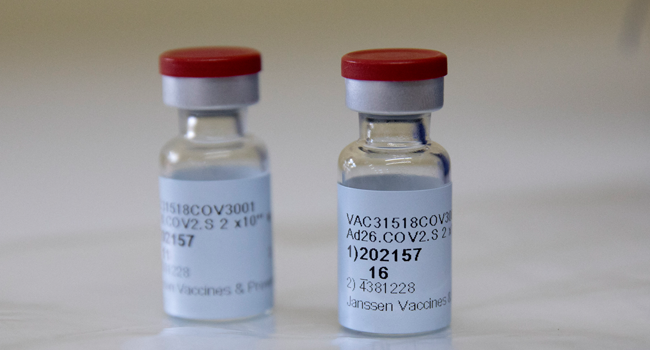US health authorities on Tuesday recommended pausing the Johnson & Johnson Covid shot over blood clot fears, with the company quickly announcing it would delay its European rollout, in a setback for global immunization campaigns.
Out of nearly seven million Americans who have so far received the single dose vaccine, six women aged between 18 and 48 developed a rare type of clot in the brain along with low platelets, officials said.
One later died while another is in critical condition.
Food and Drug Administration scientist Peter Marks said the disorder might be triggered by a rare immune response to the vaccine similar to that seen among a few hundred recipients of the AstraZeneca jab in Europe.
Both vaccines are based on adenovirus vector technology.
“We have made the decision to proactively delay the rollout of our vaccine in Europe,” J&J said, in a fresh blow for the hard-hit continent which passed the threshold of one million coronavirus deaths.
The European Union has signed a deal for 200 million shots of the vaccine with an option for 200 million more.
US authorities are now carrying out an investigation which could end up leading to tough regulatory choices, such as restricting the J&J shot to subsets of the population.
People who have received a J&J shot within the past three weeks were asked to report to their doctors if they experienced severe headaches, abdominal pain, leg pain, or shortness of breath.
But the White House said it was confident there would be no “significant impact” on the vaccination plan in the world’s hardest-hit country, where almost half of all adults have now received at least one dose.
Jeff Zients, President Joe Biden’s Covid-19 response coordinator, said that a huge surplus in the supply of two other vaccines — Pfizer and Moderna — meant the country could easily take up the slack.
‘So happy’
More than 800 million vaccine doses have now been administered globally, according to an AFP tally.
India — which is experiencing a record surge in cases — was given a boost as it authorized Russia’s Sputnik V Covid-19 drug.
The total number of virus deaths is approaching three million, as the World Health Organization warned infections are rising exponentially despite efforts aimed at stopping them.
Muslims around the world started Ramadan after religious leaders confirmed the month of fasting would begin on Tuesday, with many countries facing virus restrictions.
Jakarta’s newly renovated Istiqlal Mosque — Southeast Asia’s largest — welcomed worshippers for the first time after more than a year of closure because of the pandemic.
Mohamad Fathi, a resident of the Indonesian capital, told AFP this year’s Ramadan was happier than in 2020.
“This year, I am so happy finally we can go to the mosque to perform tarawih prayers at the mosque, although we are under strict health protocol during the prayer.”
Mosques in the world’s most populous Muslim-majority nation will only be able to host people at a maximum of 50 percent capacity. Worshippers are required to wear masks and bring their own prayer mats.
Saudi Arabia, home to Islam’s holiest shrines, announced that the holy fasting month was to start on Tuesday, though authorities said only people inoculated against Covid-19 will be allowed to perform the year-round umrah pilgrimage from the start of Ramadan.
In the Kazakh capital Nur-Sultan, coronavirus restrictions irked some worshippers.
“This year for example we won’t have the (large) iftars. And we can’t have a lot of people in the mosque. We have to queue and wait,” said 30-year-old Toparkhan Bergenov.
India gets Sputnik
Pakistanis will only begin fasting Wednesday after rival Moon-sighting committees agreed to a nationally applied start of the holy month.
With the country in the grip of a third wave of the coronavirus –- the deadliest so far -– the government urged mosques to only allow prayers in open courtyards and to strictly enforce social distancing.
But shoppers thronged markets Tuesday ahead of fasting, sparking anxiety among some.
In neighboring India health officials have been battling a huge surge in cases in recent weeks that has prompted night curfews and a clampdown on movement and activities.
The country of 1.3 billion people on Monday reported more than 161,000 new cases — the seventh-consecutive day that more than 100,000 infections have been recorded.
Experts have warned that huge, mostly maskless crowds at political rallies and religious festivals have fueled India’s caseload, and in the Himalayan city Haridwar, maskless Hindu pilgrims have ignored social distancing pleas.
Pandemic growing ‘exponentially’
In Europe, Germany agreed to controversial changes to a national infections control law, handing Berlin more power to impose tougher measures.
Those measures include a 9 pm to 5 am curfew and stricter rules around private gatherings and sports.
Maria Van Kerkhove, the WHO’s technical lead on Covid-19, said the world was now at a “critical point” of the pandemic.
“The trajectory of this pandemic is growing… exponentially,” she added.
The organization also called for a halt to the sale of live wild mammals in food markets to prevent the emergence of new diseases such as coronavirus.
AFP


